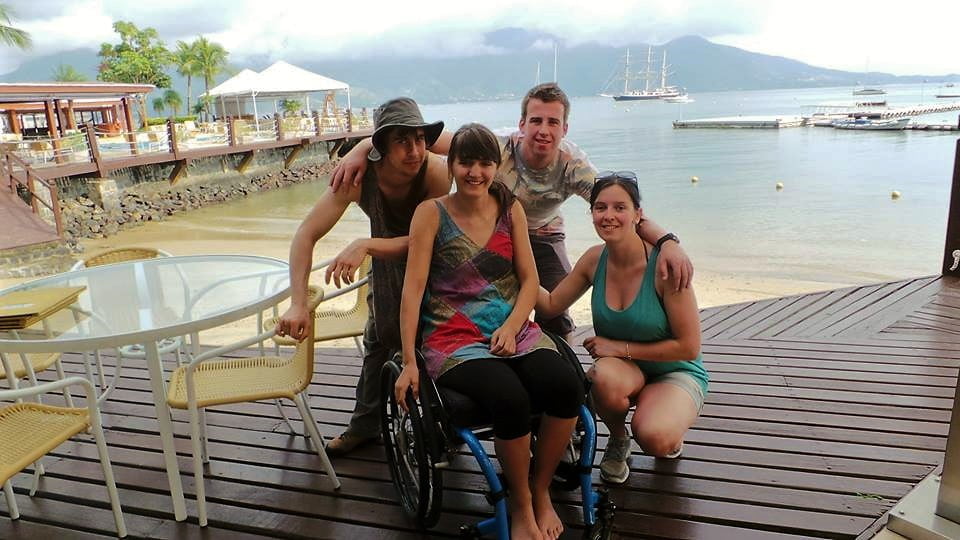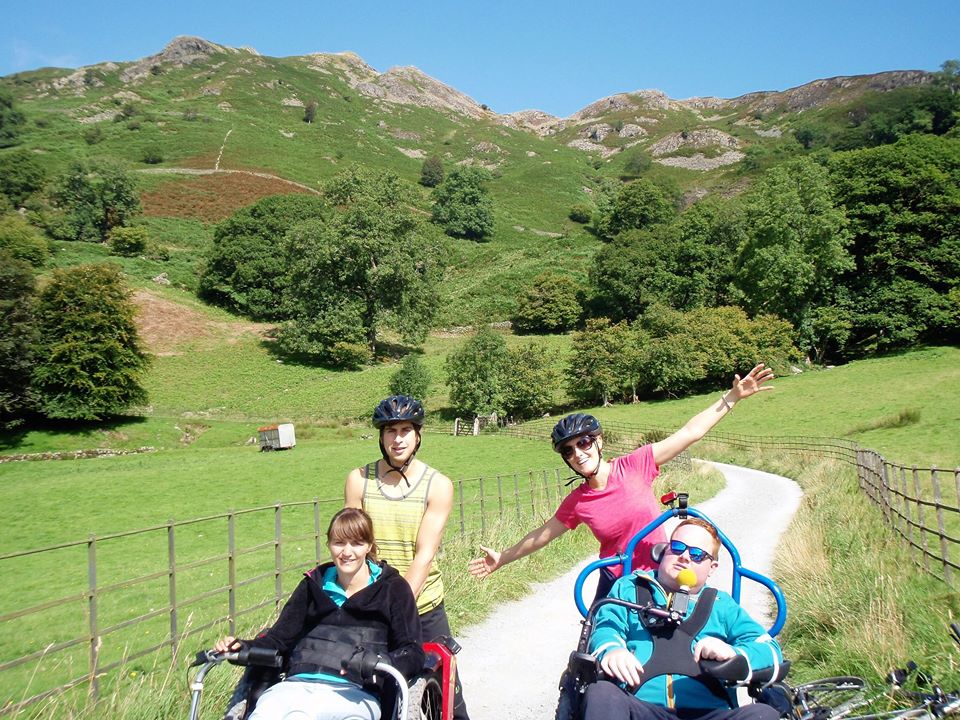Beth’s story: Another meaning for independence
1 February 2017

It could be thought that being dependent on others is the antithesis of being independent. However, as my injury limits the use of my lower and upper limbs, making me reliant on the support of personal assistants for many everyday tasks, independence takes on a slightly different meaning than it might conventionally evoke. My dependence on others does not prevent me from either pursuing my goals or having the freedom to choose what I do with my life. I gain my independence through ensuring that the support I receive enables me to do these things. However, it has not always been easy and it has been a massive learning curve to feel independent and happy with the support I receive.
Before I sustained a spinal cord injury, I was a happy, (relatively) care-free, 18 year old rock-climber. Life was good: I had just learnt to drive, I was planning a year of travelling and climbing, and I had a conditional place at the University of Sheffield for afterwards – I felt pretty free and I was excited for the future! However, upon breaking my neck in a car accident, I was faced with a new reality of life using a wheelchair, dependent on the support of others to help me to achieve my goals. In the eight months I spent in Sheffield Spinal Unit and the seven months I spent in a residential home waiting for my parent’s house to be adapted, I began to gradually accept my new situation. Defining moments include being told, just three weeks after my accident, that I should try not to get too down about not being at Glastonbury with my friends that day, as I would be able to go next year in an off-roading wheelchair. At the time I hadn’t even sat up in bed properly, so the idea that I would need to use a wheelchair next year hadn’t even crossed my mind – I was still determined I would be able to climb again and go on the trips I’d planned! I also remember one night, probably two months post-injury, when I was told by a nurse that it was unlikely that I would gain any finger movement back. She said that people lived normal lives with the function I had but just needed PAs to help them. I struggled to comprehend how this was possible and how I would ever feel independent again.
This process of coming to terms with my situation and trying to feel “normal” and independent continued after I moved back to my parent’s house with a care package in place. This package consisted of having a team of 4 PAs with 1 PA working with me every 24 hours. It was a huge adjustment, not only for me but also for my parents, who had to get used to always having people in our space. To begin with, this sometimes prevented me from actually going out or doing things as I felt too conscious of needing support from my PAs.
I would sometimes limit what I did to only spending time with friends as I didn’t need a PA with me. I also struggled to find much in common with a couple of my PAs as they were 20 years older than me which made me feel self-conscious around them.
On top of this, it was incredibly difficult as a newly injured person to get used to telling people what I needed. I was still figuring out what worked well and what didn’t and what I could do without help. It was often frustrating, and I’m sure it was hard for my PAs too.
I spent only six weeks at home before I had to move away again to university and into student halls – this felt far too fast and I was not in any way prepared. My first semester was difficult as I lacked the confidence to put myself out there and meet new people, which was important as I’m a sociable person and didn’t live in a shared flat. I also felt held back by using a wheelchair and having PAs around me constantly. But going on a Back Up ski karting course in Sweden at the end of my first semester was exactly what I needed to realise that things didn’t have to stay this way. The course was incredibly motivating and I came back with renewed confidence to take control of my life again.

Beth in Sweden on our Ski Karting course
Skiing in Sweden really did give me the push to start thinking about changing my care team. The setup limited me to certain changeover times and I didn’t feel entirely comfortable around my PAs, as they weren’t always reliable. But I continued with that team for two more years because – despite my new-found confidence – I was worried that changing everything might be worse. However, in 2012, at a Back Up mentor training weekend, I remember a new friend telling me how his live-in care package offered him the flexibility to do what he wanted whenever he liked, and how comfortable him and his girlfriend were living with PAs. This motivated me to make the change. (Incidentally, this is one of the best things about Back Up – it offers people with a spinal cord injury the opportunity to make friends with people in similar situations who truly understand and can help you overcome issues).
I now use an agency who provide me with live-in PAs who stay for two weeks at a time. I have some great regular PAs – my main one (who has become a good friend) works two weeks on, two weeks off. Sometimes I have new PAs as the job attracts young people who enjoy travelling, but the care managers have a good understanding of who I’ll get along with and it usually works really well.
This change has enhanced my independence as I have more flexibility in my life, and I am happier and more comfortable with the people who work with me.

Beth visiting friends
I have learnt a lot along the way (and will continue to do so) about how to ensure my relationships with my PAs work. I am by no means perfect, but these are a few of the most important things I have learnt:
- Feeling comfortable with PAs is essential. It is a close two-way relationship so we both have to get along well for it to work. Everyone has very different personality traits and people do clash from time to time. I try hard to get along with everyone, but – if it isn’t working – I have learnt to be OK with starting with someone new.
- My care is my responsibility. Firstly, it is important to not rely on PAs to think for me – I should be in control of my own life. This requires being organised and explaining what I need in an understandable way. That said, this has been a difficult skill to learn and I try not to insult a PA’s intelligence by explaining the simplest of tasks or confuse them by listing loads of things at once! This obviously gets easier the more someone gets to know me. Secondly, I try to do as much as possible for myself without help. Sometimes this is a mental battle as I have to weigh up the exhaustion and time spent trying to do something on my own against actually getting it done so I can get on with my day and focus on my other goals (of which I have many!).
- It is important to be honest and open. If there’s tension in the house, I find it works well to talk about it to try make things right again. Don’t be afraid to apologise or to compromise. For the relationship to work well, both people need to be happy.
- Be sensitive to each other. It is also important to remember that everyone has bad days and gets moody at times, myself included. If this is the case and it’s something small, or one of us is just tired, it’s often not worth saying anything as it will all blow over.
- Space is important. We both need time to ourselves, especially with live-in care. I live with my boyfriend so we can just go out or I can see my friends. I do appreciate it’s a very difficult job for PAs to put their own life aside to help me live mine. That’s why it’s important that they have time to relax and do what they want, like go to the gym or head out for a walk.
In this way, the relationship is about mutual respect and teamwork – my PAs do become good friends and I enjoy having them around.
My life has changed so much since I was struggling to adapt to being dependent on others. Now, aged 26, like many other people in my position, I lead a fulfilling and busy life. I graduated from university (with a first!) and I am now studying towards a Masters with the aim of becoming a solicitor. I enjoy a range of sports, from wheelchair rugby to sit-skiing, and I love to travel. My favourite trips include sailing on a tall ship down the coast of Brazil, skiing in Colorado and driving through Italy. I have an active social life, a great boyfriend and I enjoy volunteering for Citizens Advice Bureau and Back Up. Having support from others to get to this point doesn’t take away from my achievements, it’s just made all of them possible.
If you’d like to talk to us about issues surrounding your personal care team, please email our outreach team or call us on 020 8875 6723.

